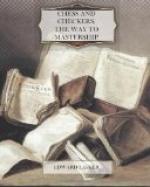I have tried to develop these principles in a simple way so that they are sure to be easily understood, and I have been greatly aided in my task by Miss Helen Dvorak and Mr. Eugene Fuller, who, without any previous knowledge of the game, have learned it in reading through the manuscript of this book. They have given me many valuable hints in pointing out all that did not seem readily intelligible to the mind of the beginner.
In explaining the game of Checkers, to which the second part of the book is devoted, I have also tried to develop general principles of strategy, rather than to offer a mere classification of analyzed lines of play, which the reader would have to memorize in order to be able to compete with experts.
I was fortunate enough to secure the collaboration of the Checker Champion, Alfred Jordan, who enthusiastically adopted the new idea of teaching and furnished most of the material which I have used in illustrating the vital points of the game.
Edward Lasker.
INTRODUCTION
The History of Chess
The game of Chess in the form in which it is played to-day is usually assumed to be of a much older date than can be proved with certainty by documents in our possession. The earliest reference to the game is contained in a Persian romance written about 600 A.D., which ascribes the origin of Chess to India. Many of the European Chess terms used in the Middle Ages which can be traced back to the Indian language also tend to prove that India is the mother country of the game.
We are, therefore, fairly safe in assuming that Chess is about 1300 years old. Of course we could go farther, considering that the Indian Chess must have been gradually developed from simpler board games. Indeed we know from a discovery in an Egyptian tomb built about 4000 B.C. that board games have been played as early as 6000 years ago; but we have no way of finding out their rules.
The game of Chess spread from India to Persia, Arabia and the other Moslem countries, and it was brought to Europe at the time of the Moorish invasion of Spain. It also reached the far East, and games similar to Chess still exist in Japan, China, Central and Northern Asia, the names and rules of which prove that they descended from the old Indian Chess.
In Europe Chess spread from Spain northward to France, Germany, England, Scandinavia and Iceland. It became known with extraordinary rapidity, although at first it was confined to the upper classes, the courts of the Kings and the nobility. In the course of time, when the dominance of the nobility declined and the inhabitants of the cities assumed the leading role in the life of people, the game of Chess spread to all classes of society and soon reached a popularity which no other game has ever equaled.




